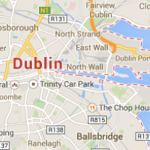Yesterday, Google reminded me that I had a half hour left on my shift.
Along with this it showed me a map highlighting my current location, my destination and my route of choice for getting there – complete with up-to-date traffic information so I could see how long the journey might take.
The thing was, I had never told Google any of this information – nor did I ask for a reminder of my clocking-off time.
I’ve never told Google my work hours, I’ve never told it where I work, I’ve never told it where I live and I’ve never told it my route between those two locations.
That is to say that I’ve never actively told it any of this.
What I have done, however, is switch to an Android phone for a few weeks while my iPhone is out of action.
During the set-up process I casually activated the Google Now feature, and thought no more about it until yesterday’s information.
However in doing so, I had given Google permission to monitor pretty much everything I did with the phone and present me with information based on what it “learned”.
With that in mind I can only assume that – via the GPS on my phone – Google had noticed me moving between these two locations every day of the week – generally at the same times – and “learned” that this was where I work and when I tend to finish up.
There’s no other way it could have figured it out, from what I can think – I don’t put my hours into Google Calendar, nor do I have them detailed in Gmail.
This bit of knowledge was almost certainly based on my movements alone.
I should say that this post isn’t necessarily here to bemoan the menacing hand of modern technology – I had to activate Google Now and should have known better than to be surprised by this result.
However, Google’s prompt has made me better appreciate the trail of information we passively leave behind us every day; well in excess of the obvious flash-points of public Facebook data and the Twitter feed.
It also made me better appreciate just how sophisticated computers are becoming at interpreting data and making fairly-accurate assumptions from there.
After my brush with Google Now’s cognitive reasoning I was about to turn the feature off to avoid a repeat performance, but I’ve since decided to leave it on – for now at least.
I currently using Google’s phone OS (until the iPhone is resurrected, at least), its mail and chat client, its search engine, its mapping software and (in work) its web browser.
I’m equal parts intrigued and terrified to learn what else it figures out about me.
